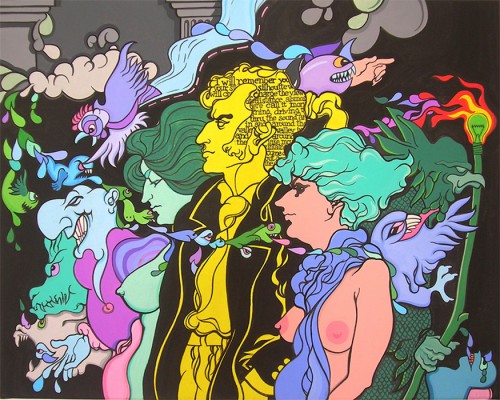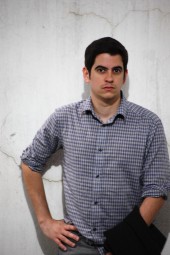Jumping into an Empty Pool by Osdany Morales
by Sampsonia Way / August 21, 2013 / No comments
Translated by Diana Álvarez-Amell

Art by Luis Trápaga.
1
If this were a Woody Allen film, Ariel Costa thought, the evening he arrived in Santo Domingo, I would meet two women at two different bars.
I would vaguely fall in love with both. One would be American—an actress vacationing in the tropics. The other would fit the same description with the same three attributes. But the first would be blond, the second one brunette.
- Osdany Morales
- He has published the short story collections Minuciosas puertas estrechas (Unión, 2007) and Papyrus (Letras Cubanas 2011 y Sudaquia, New York, 2012)
- His texts have been included in several short-story anthologies of recent Cuban literature, such as Maneras de narrar (Unión, 2006), Los que cuentan (Caja China, 2008), La fiamma in boca (Voland, Italia, 2009), as well as in a number of magazines such as El Cuentero (Cuba), El perro (Mexico), Quimera (Spain) and Ragazine.CC (USA). Read More.
In short order I would marry the blond. Together we would fly out to Los Angeles. Her father would see something of himself in me, as he was years ago when he was younger, except for the part about me being Cuban. Stirred by the reflection of his own image, my father-in-law would arrange for me to meet with producers. They would acquire the screen rights to my short stories with the idea of turning them into blockbuster movies. I’d settle for an oceanfront home where I would write, all the while feeling inscrutably happy.
2
- The Writer Speaks
- Interview by Matías Claro and Francisco Gallegos.
- “Writing is important to me, to begin with, because the ambition of staging an experience that runs in parallel to my life replaces my life or makes living more intense. When one perceives a space from which he can connect with others, while still being alone, I think we have found something really worthwhile.
”
- Diana Álvarez-Amell
- Diana Álvarez-Amell, critic and translator, teaches at Seton Hall University. Her critical edition of Cirilo Villaverde’s Tres Novelas. Teresa, El Penitente y Dos Amores has just been published in Spain.
One morning, on the golf course, my father-in-law would introduce me to Orson Martinez. He is the ghostwriter who would adapt my stories into screenplays. Orson Martinez is French and spellbound by American movies. His successful screen adaptations have brought several stories to life and have spawned over seven sequels. Some even made it past a fourth prequel.
Orson Martinez’s theory is that if you are French and so taken with Hollywood movies, the best thing to do is move to California and start making films. The rest would take care of itself. I am clueless as to what “the rest” is, although my wife and her father seem to know. They both nod and then look at me.
Orson Martinez takes the book I published in Cuba. He waves good-bye from his convertible as he drives away with my book. He sends a text message to let me know he made it home but has yet to read my book. He sends a text message again after reading the first story and then another after the second story. After that there are no more texts. He shows up at my house in Los Angeles at exactly twelve past four. The pages of my book are all scribbled with notes. Although I don’t quite get it, he found a movie somewhere in those stories.
My wife asks whether it has a role for her. It does. It is that of a woman whose son goes missing. She asks him whether it also has a role for her dear friend Jimmy. It does. He is the one who kidnaps the child, but that is to be revealed only towards the end of the movie. My wife squeals delightedly. She is torn between texting or phoning. She decides to call. Jimmy, she whispers on the phone, we have a screenplay. We both have parts. Jimmy’s own squeals are heard on the other end of the line. It’s Ariel’s script. Wait until you read it. You’ll be so excited you’ll be jumping into an empty pool.

Art by Luis Trápaga.
Orson Martinez turns his head and stares at her as if she had been, as it were, indiscreet. But no, he simply liked what he heard. In the margin of a page he jots down: JUMPING INTO AN EMPTY POOL.
I ask Orson Martinez which of my stories he wants to adapt. All of them, he tells me, every single one of them to be precise. Let’s get this straight though, there is not going to be any “writer” character or mention of books either. The storyline that is to be patched together from the scraps of my stories that are originally all about writers goes more or less like this:
3
A woman—my wife—takes her three year-old son to an amusement park. A vendor hands him a fish-shaped balloon as a gift. The boy with the balloon rides the carousel. She stands by the merry-go-round snapping pictures of her son. In the split second when the boy is hidden from her view as the carousel rotates, she sees the inflated fish ascend. When the carousel turns around again, the seat where her son sat is now empty.
The fish floats above the park that begins to seem progressively smaller. This could mean that a high angle shot takes the fish’s point of view. Or perhaps it is a metaphor for the impossibility that my wife will ever see her child again. She has a dear friend named Jimmy. She calls Jimmy to tell him her son was kidnapped because of that “thing with the father.” She is convinced there can be no other explanation.
The police begin tracking down leads from the pictures she took that day. There isn’t much time. Her husband is nowhere to be seen except in photographs. He disappeared years ago. A scientist, he had performed experiments on himself trying to have children. My wife conceived a child fathered by this now long gone scientist.
She gave birth to the child. But there was always something peculiar about the boy. By age three he stopped growing. He was a veritable genetic fountain of eternal youth. A lot of dangerous people were after him in hot pursuit. To escape from them she had to keep moving. Her life had become a never ending flight, always running away with her son in tow. And she senses she’ll grow old just trying to rescue him because—can you imagine?—her son is going to be three forever.

Art by Luis Trápaga.
4
On the film’s opening night I would ask Orson Martinez what the boy not growing past his third birthday was all about. He would tell me that there were four plausible explanations:
1. It was a French nod and a wink to American films. 2. It was a distilled version of all the writers who show up in all of my stories. 3. It was Orson Martinez. 4. It was Ariel Costa himself.
For my sake, he would let me pick which it would be. Then I could go ahead and happily sign the screen rights to all the sequels and the prequels. That would make my job easier. Think about it, he ends up telling me, the kid is eternal. As long as you don’t get off track, everything should come up roses.
Afterwards I would return home, trailing behind my wife. Once there, still in my tuxedo, I’ll wonder, Ariel Costa thought, whatever happened to that brunette, the other actress I would have met at a bar one evening in Santo Domingo if this were a Woody Allen film?
Edited in English by Joshua Barnes
__________
All facts and characters appearing in this work are fictitious. Any resemblance to real persons, living or dead, is purely coincidental.
Los hechos y/o personajes de esta historia son ficticios, cualquier semejanza con la realidad es pura coincidencia.
Leer en español.
__________





